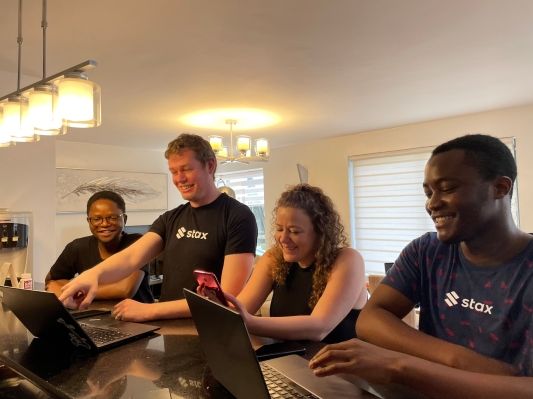Stax, a Pan-African Super App that Allows Transactions via Automated USSD Codes, Raises $2.2M in a Seed Round

Stax, a firm that uses automated USSD codes to allow Africans to buy airtime, send and request money, and move payments between accounts has secured a $2.2 million initial extension round.
World Within Ventures and Noemis Ventures, both headquartered in the United States, lead the seed extension round, and now join Anthemis Group, Orange DAO, 500 Startups, Garuda Ventures, and GAN Ventures on the cap table.
Stax promotes itself as a remote team, with personnel based in the United States, the United Kingdom, Nigeria, and Kenya. Its platform is operational in ten African markets, but it only fully serves six — Kenya, Uganda, Tanzania, Nigeria, Ghana, and Ethiopia — where consumers may access more than 100 banks and mobile money accounts.
In a market where internet-enabled app-based banking has the potential to reach 300 million users on the continent, USSD technology, which is mostly utilized by feature phones and is primarily used offline, outperforms it with 850 million connections. This technology allows users to send and receive money, pay bills, and buy data without having to go online, and according to studies, it accounts for more than 90% of digital transactions in Sub-Saharan Africa.
Founded by Ben Lyon, Jess Shorland, and David Kutalek, the super app collects all USSD codes from numerous accounts and organizes them into an app that users may use offline to conduct transactions without calling any USSD codes.
“Stax is all of your bank accounts, mobile wallets, and crypto in a single app that works without mobile data. What we’re trying to respond to is tap into this recognition that you have about 300 million Smartphone owners across Africa, who have a strong preference to transact via USSD instead of apps because they keep their mobile data turned off.” Stax CEO, Lyon said.
“And so what we’re doing is building for them, because despite having a Smartphone, they want to be offline. And that’s the sweet spot where Stax comes out.”
The platform pulled out from beta in May of last year. It had less than 3,000 monthly active users in its initial month, but it has since expanded to over 170,000 clients, with just 40,000 of them being active monthly users.
While USSD is praised for its simplicity of use and offline capabilities, experts have long warned that faulty validation in the technology might lead to assaults from hackers who are willing to divulge sensitive data.
Lyon acknowledges this issue and draws attention to the lack of a unified data regulation, which he feels is somewhat responsible for these issues. “For any company that wants to go pan-African, then it’s going to be intensely difficult to comply with all of those local regulations. And so my view on that is that the only way to win that game is to play a different game,” he said.
Users only need to give Stax permission to send and see messages, access contacts, and make and manage phone calls when they download the program. These rights, according to Lyon, do not reveal personal information about clients. As a result, in the case of a hack, hackers are unable to hurt users, do anything with stolen data, or move money.
“We would like to know as little as possible about our users individually; we don’t want to know their personal and identifiable details. So just moving toward saying this is a utility app for your money void of advertisement and cross-selling, we’re never going to sell your data, we’re never going to try and narrow ads to you,” explained the CEO on how Stax combats this situation.
Hover was the company’s initial iteration. It was an API platform that allowed developers to create USSD rails-based apps. After the platform failed to generate enough income from developers after two years, the company decided to move vertical and create Stax, a universal money app for African customers based on USSD rails. Hover is still the parent firm.
“We recognized that almost all digital financial services in the continent use USSD as their primary channel. So we set out originally with the question of ‘how can we make USSD programmable and how can we open it up so that one could effectively kind of screen scrape USSD services to build new experiences on them?’” said Lyon.
Stax intends to introduce various features along the way, including a self-custody crypto wallet that will start with USDC, allowing customers to purchase airtime while dialing non-financial digits. When Stax’s Series A round closes, the seed extension will allow it to further develop these capabilities and extend its services from 10 to 50 African nations.
Stax is also pursuing an emerging market strategy, according to Lyon, in which it will extend outside Africa into other regions where USSD is widely used, such as South and Southeast Asia. But that will be a long time coming.
